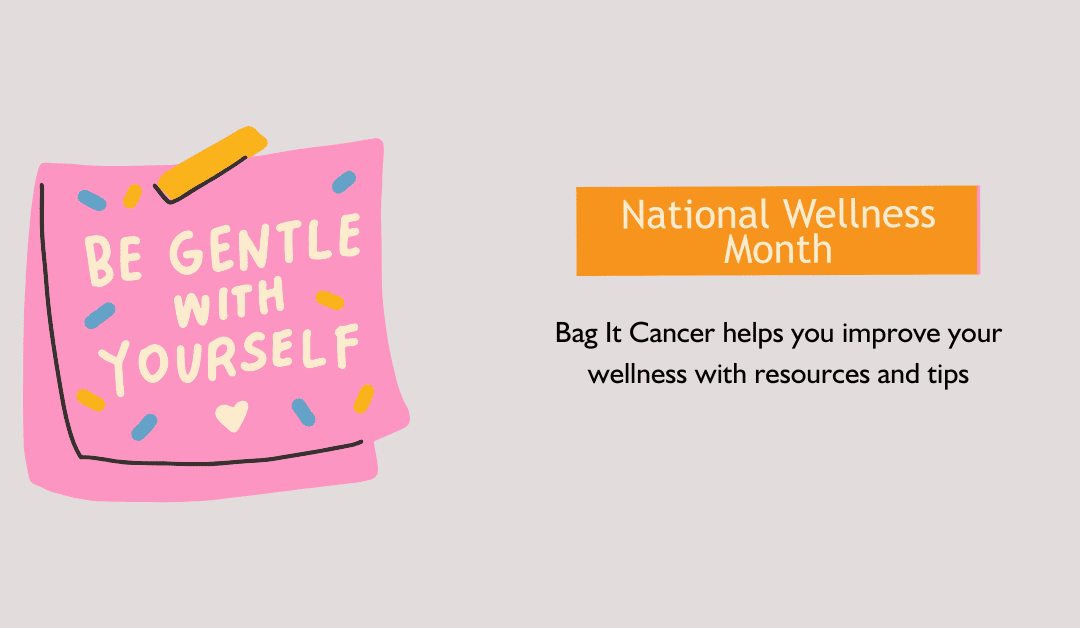
by Bag It Team | Aug 5, 2025 | Educational Articles
August is National Wellness Month—Explore how Bag It Cancer helps nurture physical, emotional, and informational well-being on your cancer journey.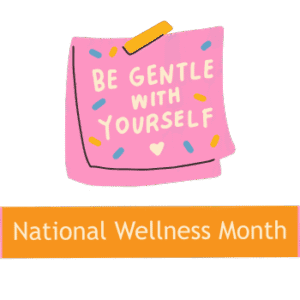
Navigating a cancer diagnosis or supporting a loved one through theirs can bring a whirlwind of emotions, decisions, and challenges. That’s why National Wellness Month is such an important time to pause, reflect, and reconnect with the things that support your overall well-being—not just physically, but emotionally and mentally too.
At Bag It Cancer, we believe that wellness isn’t one-size-fits-all. It’s not about perfection or pressure—it’s about feeling empowered, informed, and supported, no matter where you are in your journey. Whether you’re newly diagnosed, a long-time survivor, or a caregiver walking alongside someone you love, small steps toward wellness can make a meaningful difference.
Empowering Through Information
One of the most powerful ways we support wellness is by putting trusted, understandable information directly into your hands. The Bag It resource bag includes tools to help you stay organized, learn more about your diagnosis, keep track of important documents, and feel more in control of what’s ahead. When people understand their options and feel confident asking questions, they often feel less overwhelmed and more engaged in their own care.
Emotional Wellness Matters
We also know that wellness includes how you’re feeling—mentally and emotionally. That’s why our materials include space to journal your thoughts, track how you’re doing day-to-day, and write down questions or reflections. These small actions can bring clarity and comfort during times of uncertainty. You don’t have to have all the answers—you just need space to process and tools that support your journey.
Caregiver Support Is Wellness, Too
If you’re a caregiver, your wellness matters just as much. It’s easy to focus all your energy on your loved one, but taking moments to care for yourself helps you stay grounded and connected. Bag It includes resources designed just for caregivers, offering guidance, encouragement, and ways to feel supported in your role.
4 Simple Ways to Focus on Wellness This Month
1.Step outside and enjoy a moment of fresh air
2.Journal three things you’re grateful for
3.Take a few deep breaths with intention
4.Revisit your Bag It materials for insight and clarity
Wellness Resources
Cancer wellness resources encompass a wide range of support and information for individuals and their families affected by cancer. These are just a few of the available resources offering emotional support, financial assistance, information about treatment options, and access to support groups and more.
American Cancer Society Wellness Resources
National Institutes of Health Emotional Toolkit
Explore the Bag It Cancer Resource Center for additional trusted, accessible support.
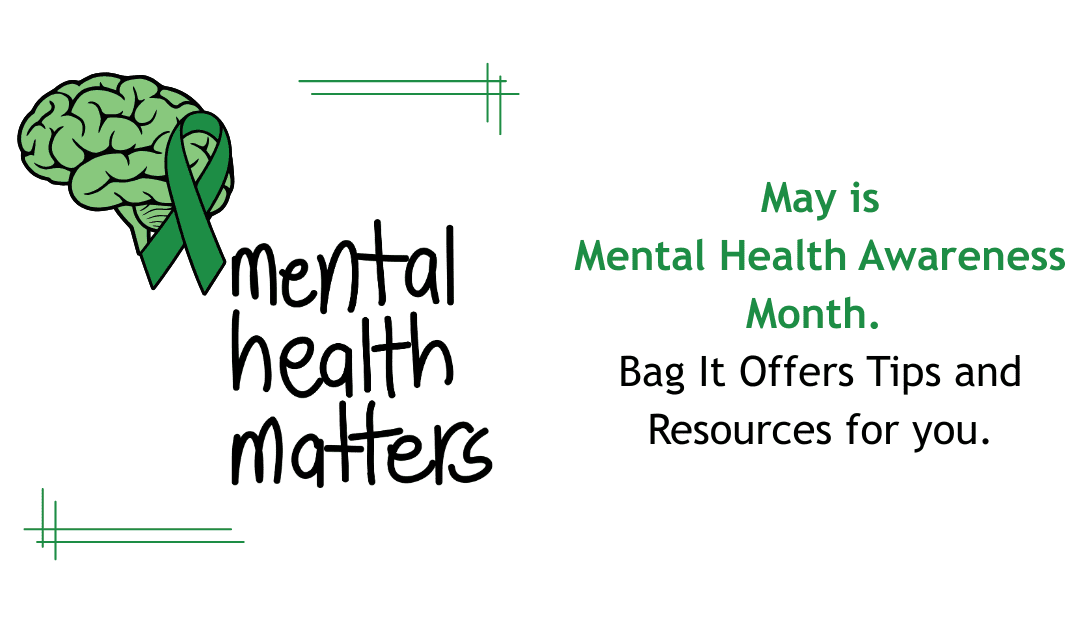
by Bag It Team | Apr 29, 2025 | Educational Articles
May is Mental Health Awareness Month, a time to pause and reflect on how we care for our emotional well-being—something that affects all of us, no matter our background or health status.
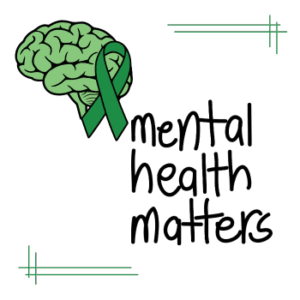 At Bag It Cancer, we work every day to support those impacted by cancer, and we see firsthand how critical mental health is throughout the journey. But the truth is, everyone faces stress, uncertainty, and emotional challenges at different points in life—whether you’re navigating a diagnosis, caring for a loved one, or simply managing the pressures of daily life.
At Bag It Cancer, we work every day to support those impacted by cancer, and we see firsthand how critical mental health is throughout the journey. But the truth is, everyone faces stress, uncertainty, and emotional challenges at different points in life—whether you’re navigating a diagnosis, caring for a loved one, or simply managing the pressures of daily life.
Mental health is health. It deserves our attention, our compassion, and our time.
Here are a few small ways anyone can support their mental well-being this month:
- Take a mindful break. A few minutes of quiet breathing or stepping outside can reset your mood.
- Connect with someone. A conversation with a friend or loved one can make a big difference.
- Practice kindness—especially toward yourself. Let go of perfection and embrace progress.
If you or someone you know is in emotional distress or crisis, help is available. Call or text 988 to reach the Suicide & Crisis Lifeline—free, confidential support 24/7/365.
Looking for helpful mental health tools?
Here are a few trusted resources:
CancerCare: Coping with Cancer
Mental Health America: Mental Health Month Toolkit
Headspace: Free Mindfulness Tools
Caring for your Mental Health
Whether you’re a patient, caregiver, donor, or part of our extended community—thank you for standing with Bag It. Let’s continue supporting the whole person—mind, body, and spirit.

by Bag It Team | Jan 6, 2025 | Educational Articles
Skipping the elevator (or escalator) and taking the stairs is a simple but powerful way to boost your health. Climbing stairs strengthens your heart, lungs, bones, and muscles, and even improves balance and coordination. Even just a flight or two each day can add up to noticeable benefits over time.
 If climbing stairs isn’t your thing, there are plenty of other small changes you can make to improve your physical and mental health. The key is to incorporate these activities into your routine consistently.
If climbing stairs isn’t your thing, there are plenty of other small changes you can make to improve your physical and mental health. The key is to incorporate these activities into your routine consistently.
(Remember to always check with your doctor before beginning any new physical activity or exercise to make sure it is safe for you.)
Here are some easy ideas to up your activity every day
- Walk or bike whenever possible. If you’re heading to a nearby store, restaurant, school, or work, leave the car behind. If you must drive, park farther from the entrance to add extra steps.
- Use public transportation strategically. Get off one stop early and enjoy a brisk walk to your destination.
- Make the most of your lunch hour. Take a walk during your break, either alone for some quiet time or with a coworker for companionship.
- Combine movement with work. Hold walking meetings outdoors or pace around your office while taking calls.
- Turn family time into activity time. Walk your pet, take your partner or child for a stroll, or plan a “walk and talk” with a friend.
- Take movement breaks at work. Studies show that five-minute activity breaks each hour can counteract the effects of sitting all day.
- Stay active during TV time. Use commercial breaks for stretches, jumping jacks, running in place, or even a quick dance.
- Bring energy to chores. Dance or add extra movement while cleaning the house or doing other household tasks.
- Ditch the golf cart. If you’re a golfer, walking the course is a great way to add activity.
- Plan active get-togethers. Instead of centering social time solely around meals, organize outings with friends or family that include a fun activity like a hike, a game, or a walk. Pick something everyone will enjoy doing.
- Turn waiting time into moving time. If you’re waiting for an appointment, picking up a child, or standing in line, do simple exercises like calf raises, stretches, or marches in place.
- Make use of technology. Set reminders or alarms on your phone to prompt short activity breaks throughout the day.
- Take the long way. Choose longer routes when walking inside your home, office, or any building to add extra steps.
Small, consistent actions like these can lead to big improvements in your physical and mental well-being. Start with one or two changes and build from there—your future self will thank you!
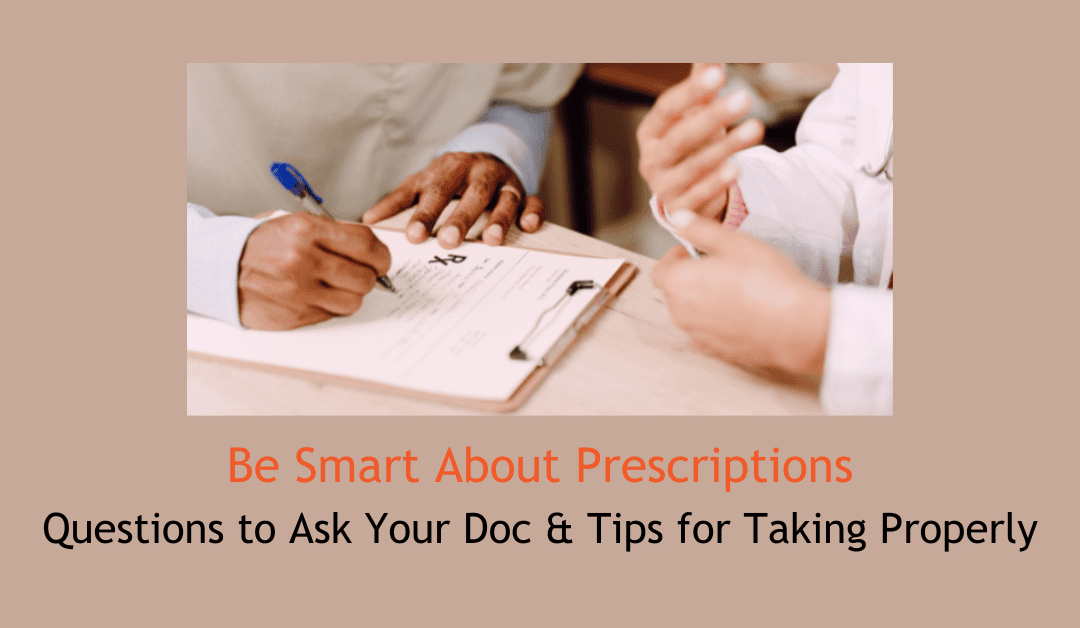
by Bag It Team | Oct 5, 2024 | Educational Articles
Taking prescriptions as directed is crucial to getting the most benefit from your medication while keeping yourself safe. To help your healthcare providers prescribe the right medications, it’s important to share a full list of everything you’re taking, including prescription drugs, over-the-counter medications, vitamins, minerals, supplements and herbs. Many supplements and over the counter medicines can interact with prescription drugs, so being forthcoming with this information is key. Also, make sure to mention any allergies.
The first step in properly using your prescriptions is understanding them. When your healthcare provider prescribes a medication, here are some essential questions to ask if the information isn’t immediately shared:
- What is the name of the medication? Get both the brand and generic names and confirm which one you’re being prescribed.
- What is the medication for? Understand the purpose of the medication and the risks of not taking it as prescribed.
- What is the correct dosage and schedule? Ask when and how often to take it, and whether it should be taken with food or on an empty stomach.
- How long will it take to work, and how can you tell if it’s effective? Know the expected timeline for results and what to do if it doesn’t seem to work.
- Are there any interactions or restrictions while taking the medication? This includes certain foods, beverages, other medications, or activities you should avoid.
- What if you miss a dose or accidentally take too much? Find out how to handle missed doses and whether refills are necessary.
- What side effects should you watch for? Both physical and mental side effects can occur, so know what to expect and how to manage them.
- Are there specific storage or handling instructions? Some medications need refrigeration, while others should be stored at room temperature or in a certain location in your home.
Tips to Help You Remember to Take Your Medications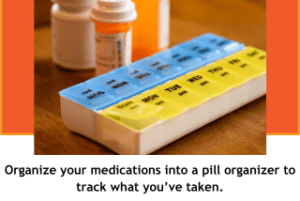
- Try to incorporate your medication routine into daily habits, like taking them with meals or at bedtime.
- Use technology, such as an alarm or a medication reminder app on your phone, to notify you when it’s time for your next dose.
- Consider asking a family member or caregiver to help remind you, especially for important medications.
- Organizing your medications into a pill organizer or separate containers for each day can make it easier to track what you’ve taken. Some pill organizers even come with built-in timers for added convenience.
Tips for Taking Medication
- Fill all prescriptions as instructed by your healthcare provider and be sure to follow the directions carefully. Complete the full course of medication unless your doctor advises otherwise.
- Never stop or change how you used medications to avoid potential safety risks.
- Use the patient forms in Section 1 of My Companion Guidebook (part of all Bag It Bags) to keep a detailed list of your current and past medications. Bring these lists to your doctor appointments and share them with your healthcare provider.
- Track your daily medication routine with customizable log forms in Section 2 of My Companion Guidebook (part of all Bag It Bags) to help you stay organized.
- It’s important to periodically review your medications with your healthcare provider or pharmacist, especially if you’re taking multiple prescriptions. This can help identify duplicate or unnecessary medications, or risky drug interactions.
- If you’re having trouble affording your prescription medications, Section 5 (Resources) of My Companion Guidebook (part of all Bag It Bags) lists organizations that may be able to help with financial support.
To see all of the helpful forms in the Bag It Bags, visit our Patient Page. You will also see a link to the forms in Spanish just under the Patients Forms heading.
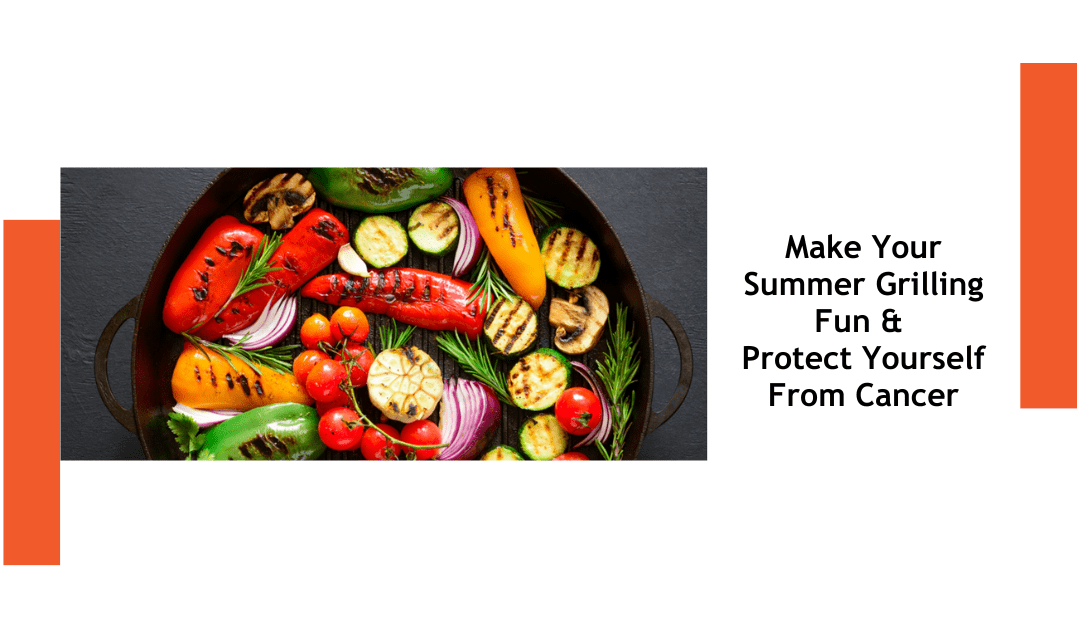
by Bag It Team | Jul 3, 2024 | Educational Articles
Grilling is a fun and tasty way to cook, especially in the summer. But did you know there are ways to make your grilled food healthier? Here are some simple tips to keep your food yummy and safe:
- Pick Lean Meats: Choose meats with less fat like chicken breasts, fish, or lean beef. Fatty meats can cause flames to flare up and create harmful chemicals. Trim off any extra fat before grilling.
- Marinate Your Meat: Soak your meat in a tasty marinade before grilling. Marinades with vinegar, lemon juice, or herbs can make your food healthier and protect against harmful chemicals that form when meat is cooked at high temperatures.
- Grill More Veggies and Fruits: Grilled vegetables and fruits are delicious and super healthy. Try grilling bell peppers, zucchini, mushrooms, pineapples, or peaches. They don’t create harmful chemicals when grilled, and they taste great!
- Avoid Burning Your Food: Don’t let your food get too dark or burnt. Burnt food can have bad chemicals. Cook at a moderate temperature and flip your food often to avoid charring. If parts do get burnt, cut them off before eating.
- Keep Your Grill Clean: Clean your grill regularly to get rid of old grease and food bits. This helps prevent harmful chemicals from forming.
- Pre-Cook Your Meat: Cook your meat a little bit in the microwave or oven before grilling. This way, it doesn’t have to stay on the grill too long and you can avoid harmful chemicals.
By following these easy tips, you can enjoy delicious grilled meals that are healthier for you. Happy grilling!





 At Bag It Cancer, we work every day to support those impacted by cancer, and we see firsthand how critical mental health is throughout the journey. But the truth is, everyone faces stress, uncertainty, and emotional challenges at different points in life—whether you’re navigating a diagnosis, caring for a loved one, or simply managing the pressures of daily life.
At Bag It Cancer, we work every day to support those impacted by cancer, and we see firsthand how critical mental health is throughout the journey. But the truth is, everyone faces stress, uncertainty, and emotional challenges at different points in life—whether you’re navigating a diagnosis, caring for a loved one, or simply managing the pressures of daily life.
 If climbing stairs isn’t your thing, there are plenty of other small changes you can make to improve your physical and mental health. The key is to incorporate these activities into your routine consistently.
If climbing stairs isn’t your thing, there are plenty of other small changes you can make to improve your physical and mental health. The key is to incorporate these activities into your routine consistently.



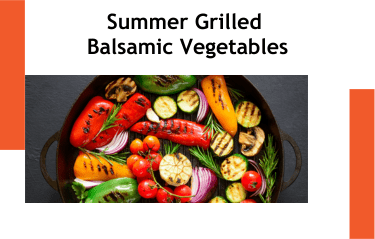
Recent Comments